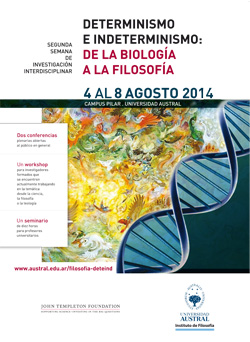Determinism and Indeterminism
From biology to philosophy
(4-8 Agosto 2014 – Universidad Austral)
Throughout the Weeks the following activities will be organized:
- Two plenary lectures open to the general public: 1) “Beyond Darwin”, Prof. Miguel de Asúa, Universidad Nacional de San Martín. 2) “The origin of life on Earth”, Prof. Rafael Vicuña. Pontificia Universidad Católica de Chile.
- A ten-hour course for academics: “Biology of development and characterization of the living being”, Prof. Francisco Güell, Universidad de Navarra.
- A Workshop for researchers who are working at present on this issue, in science, philosophy or theology.
WORKSHOP
First day: Philosophy of science. Philosophy asks Biology
1.Do physics and biology understand the notion of determinism in the same way? How does biological determinism relate with physicalism and reductionism?
Speakers:
Philosophy: Mariano Asla, Universidad Austral, Argentina.
Biology: Valeria Cantó-Soler, Johns Hopkins University, US.
Bibliography:
ROSENBERG, A.;McSHEA, D. W. (2008) “Reductionism about biology”. En Philosophy of Biology. A contemporary introduction, New York: Routledge, pp. 96-126.
KELLER, E. F. (2010) “It is possible to reduce biological explanations to explanations in chemistry and/or Physics”. En Ayala, F. J.; Arp, R. Contemporary Debates in Philosophy of Biology, Oxford: Wiley-Blackwell, pp. 19-31.
DUPRÉ J., “It is not possible to reduce biological explanations to explanations in chemistry and/or Physics”, Ibidem, pp. 32-47.
WOLFE, C. T. (2012)“Chance between holism and reductionism: tensions in the conceptualization of life”, Progress in Biophysics and Molecular Biology 30, pp. 1-8.
2. Do evolutionary, systemic and organizational accounts of biological complexity fit better with a deterministic or an indeterministic view of biological phenomena? Which are their epistemological assumptions? How do these assumptions affect the unity of biology?
Speakers:
Philosophy: Héctor Velázquez, Universidad Panamericana, Mexico.
Biology: Guillermo Folguera, Conicet-Universidad de Buenos Aires, Argentina.
Bibliography:
PERLMAN, M. (2009) “Changing the Mission of Theories of Teleology: Do’s and Don’t’s for Thinking About Function”. EnKROHS U.;KROES P.(eds.), Functions in Biological and Artificial Worlds: Comparative Philosophical Perspectives, Cambridge-MA: MIT Press, pp. 17-36.
BRIGANDT, I. (2010) “Beyond reduction and pluralism: Toward an epistemology of explanatory integration in biology”, Erkenntnis73, pp. 295-311.
LOVE, A. C. (2010) “Rethinking the Structure of Evolutionary Theory for an Extended Synthesis”. EnPIGLIUCCIM.;MÜLLER G. B.(eds.), Evolution. The extended Synthesis, Cambridge-MA: MIT Press, pp. 403-441.
Second day: Philosophy of Biology. Biology asks Philosophy
3. What is information in Biology? What is the relationship between biological information and determinism? Is ‘genetic determinism’ superseded today? Do epigenetic factors open a space for indetermination?
Speakers:
Biology: Angela Suburo, Universidad Austral.
Philosophy: María Cerezo, Universidad de Murcia.
Bibliography:
GODFREY-SMITH, P. (2007) “Information in biology”. En HULL, D. L.;RUSE, M. (eds.), The Cambridge Companion to the Philosophy of Biology, Cambridge: Cambridge University Press, pp. 103-119.
WHEELER, M. (2007) “Traits, genes, and coding”. En MATTHEN M.; STEPHENS C. (eds.), Handbook of the Philosophy of Science. Philosophy of Biology, North-Holland: Elsevier, pp. 369-399.
MÜLLER, G. B. (2010) “Epigenetic Innovation”. En Evolution. The extended Syntheis, Cambridge-MA, MIT Press, pp. 307-332.
4. In which sense does biological complexity is linked to an indeterministic framework? How can we understand the unity of the living being and its relationship with the environment from a systemic approach?
Speakers:
Biology: Marta Bertolaso, Università Campus Biomédico di Roma, Italy.
Philosophy: Francisco Güell, Universidad de Navarra, Spain.
Bibliography:
BECHTEL, W. (2011) “Mechanism and Biological Explanation”, Philosophy of Science, 78/4, pp. 533-557.
ARTIGA, M. (2011) “Re-Organizing Organizational Accounts of Function”, Applied Ontology6, pp. 105–124.
COFFMAN, J. A. (2011) “On causality in nonlinear complex systems: The developmentalist perspective”. En HOOKER C. (ed.).Handbook of the Philosophy of Science. Philosophy of Complex Systems, North-Holland: Elsevier, pp. 287-310.
Third day: Biology & Religion. Biology asks Religion
5. Does life’s emergence from the inorganic require a divine intervention?
Speakers:
Biology: Rafael Vicuña, Universidad Católica de Chile.
Philosophy: Rafael Martínez, Università della Santa Croce, Italy.
Bibliography:
DAVIES, P. “Teleology Without Teleology: Purpose through Emergent Complexity”. En RUSSELL, R. J.; STOEGER W. R.; AYALA, F. J.(eds.), Evolutionary and Molecular Biology: Scientific Perspectives in Divine Action, Vatican City: Vatican Observatory Publications, 1998, pp. 151-162.
LANE, N.; ALLEN J. F.; MARTIN, W. (2010) “How did LUCA make a living? Chemiosmosis in the origin of life”, BioEssays32, pp. 271-280.
WILKINS J., (2012) Could God create Darwinian Accidents? Zygon 47:1, pp. 30-42.
6.Could a contingent evolution including elements of chance refer to a creator God? Could divine providence cause through the random mutations proposed by the theory of evolution?
Speakers:
Biology: Jorge Aquino, Universidad Austral, Argentina.
Philosophy: Ignacio Silva, University of Oxford, UK.
Bibliography:
RUSSELL, R. J. (1998) “Special Providence and Genetic Mutation: A New Defense of Theistic Evolution”. En RUSSELL, R. J.; STOEGER, W. R.; AYALA, F. J. (eds.), Evolutionary and Molecular Biology: Scientific Perspectives in Divine Action, Vatican City: Vatican Observatory Publications, pp. 191-224.
BARBOUR, I. G. (2009) “Five Models of God and Evolution”. En Shults, F. L.; Murphy N.; Russell, R. J. (eds.) Philosophy, Science and Divine Action, Boston: Brill, pp. 17-51.


